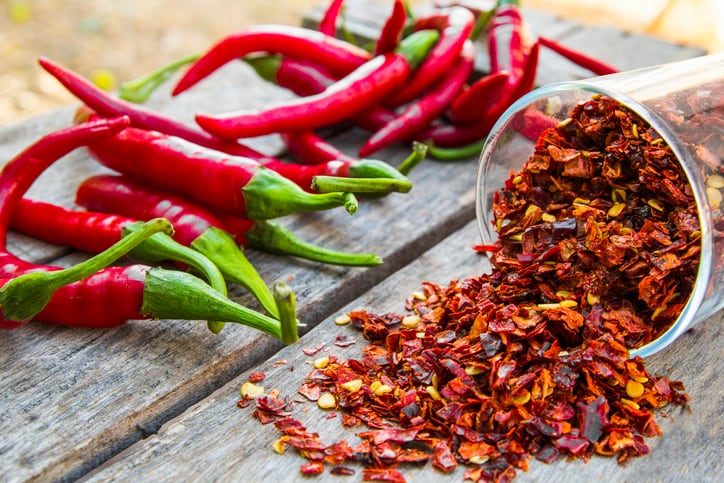The longitudinal analysis, published in Journal of the American College of Cardiology, sought to examine the association between chilli pepper consumption and risk of death in a large sample of the Italian population, accounting for biological mediators of the association.
The analysis was performed on 22,811 men and women enrolled in the Moli-sani Study cohort (2005 to 2010) and an eight year follow-up found that people who consume chilli on a regular basis have an all-cause mortality risk 23 percent lower than those who do not consume it.
The team of researchers from IRCCS Neuromed, Mediterranea Cardiocentro, Napoli, Istituto Superiore di Sanità, Roma, and the Research Center in EPIMED at the University of Insubria, in Italy, conclude that regular consumption of chilli pepper is associated with a lower risk of total and CVD death independent of CVD risk factors or adherence to a Mediterranean diet.
Results
At an 8.2 year follow up, a total of 1,236 deaths were ascertained.
Te researchers found that for people who regularly consumed chilli pepper (four times a week or more), the risk of dying of a heart attack was cut by 40 percent.
Marialaura Bonaccio, Neuromed epidemiologist and first author of the publication, says the results also suggest protection from mortality risk was independent of the type of diet people followed.
"In other words, someone can follow the healthy Mediterranean diet, someone else can eat less healthily, but for all of them, chilli pepper has a protective effect."
The study is the first to explore the properties chilli pepper in relation to the risk of death in a European and Mediterranean population.
Licia Iacoviello, director of the department of epidemiology and prevention at the I.R.C.C.S. Neuromed, adds: "Chilli pepper is a fundamental component of our food culture. We see it hanging on Italian balconies, and even depicted in jewels. Over the centuries, beneficial properties of all kinds have been associated with its consumption, mostly on the basis of anecdotes or traditions, if not magic.
"It is important now that research deals with it in a serious way, providing rigour and scientific evidence. And now, as already observed in China and in the United States, we know that the various plants of the capsicum species, although consumed in different ways throughout the world, can exert a protective action toward health."
Expert reaction
Dr Duane Mellor, registered dietitian and senior teaching fellow in the medical school at Aston University, points out that those who use more chilli may simply be eating more fresh foods and vegetables.
“This is an interesting paper exploring potential associations between chilli consumption and risk of heart disease and stroke.
"It does not show a causal link, and hints that those who were following a more traditional Mediterranean diet seemed to benefit less than those not following this type of diet.
"This could suggest it is how chillies are used as part of an overall dietary pattern and lifestyle. It is plausible people who use chillies, as the data suggests also used more herbs and spices, and as such likely to be eating more fresh foods including vegetables.
"So, although chillies can be a tasty addition to our recipes and meals, any direct effect is likely to be small and it is more likely that it makes eating other healthy foods more pleasurable.”
Dr Ian Johnson, nutrition researcher and Emeritus Fellow at the Quadram Institute Bioscience, says that whilst this is a ‘high quality’ observational study based on a large population, researchers have failed to identify a convincing mechanism for the protective effect.
“This is a high-quality observational study based on a large Mediterranean population," says Johnson. "The data has been collected using robust methods and the volunteers gave blood samples so that an impressive number of biochemical markers were also recorded.
"The results show that consumption of chilli peppers was associated with a reduced risk of death from all causes, and particularly from strokes and heart disease.
"Unfortunately, no convincing mechanism for the protective effect has been identified, and another major weakness of the study is that no evidence of a dose-response effect could be found.
"It is hard to believe that, assuming this is a real effect, any low level of chilli consumption is protective, with no additional benefits conferred by higher doses.
"This type of relationship suggests that chillies may be just a marker for some other dietary or lifestyle factor that hasn’t been accounted for but, to be fair, this kind of uncertainty is usually present in epidemiological studies, and the authors do acknowledge this.”
Source: Journal of the American College of Cardiology
Bonaccio. M., et al
"Chili Pepper Consumption and Mortality in Italian Adults"
DOI: 10.1016/j.jacc.2019.09.068


